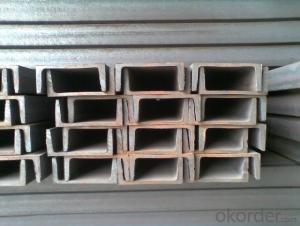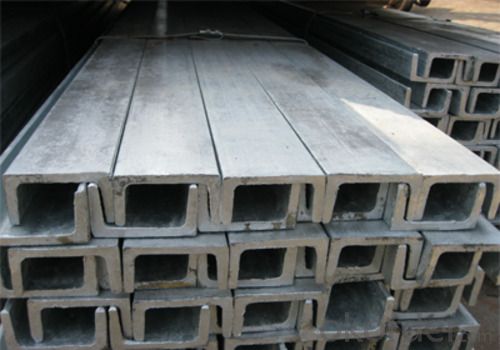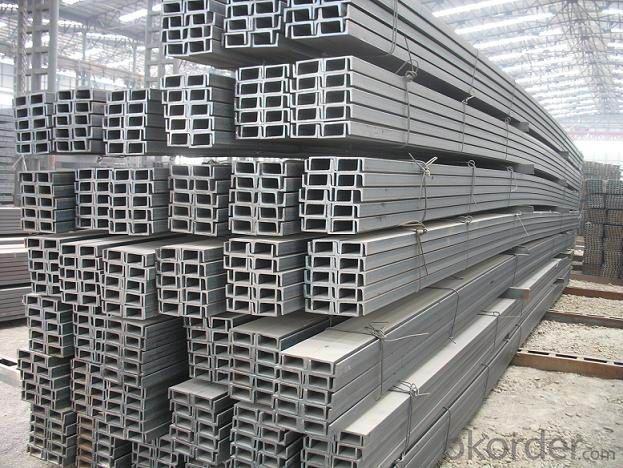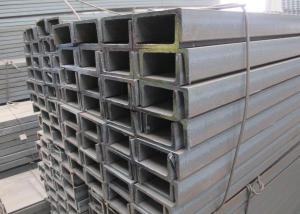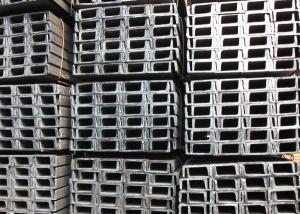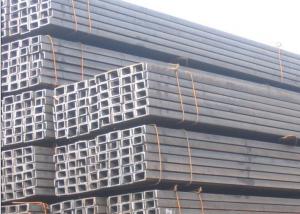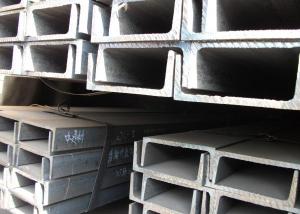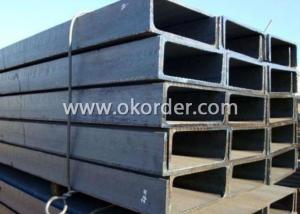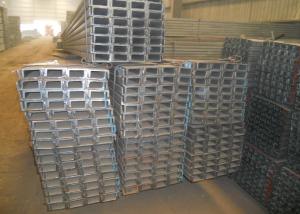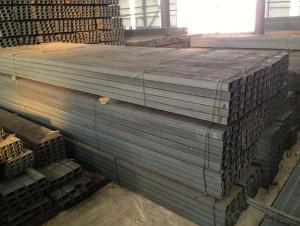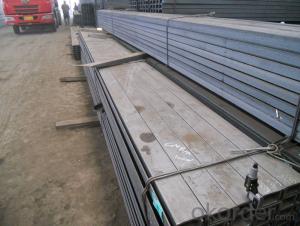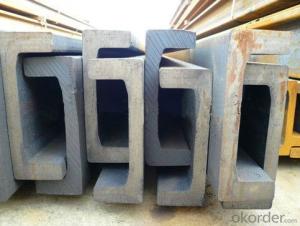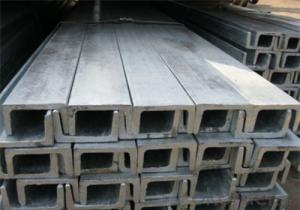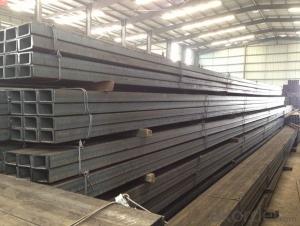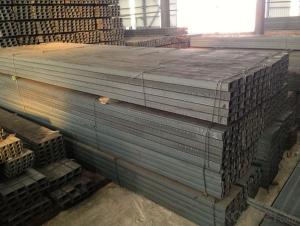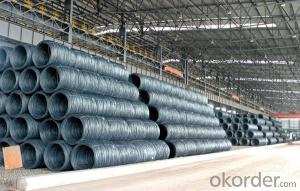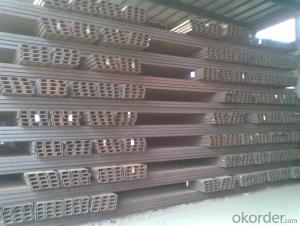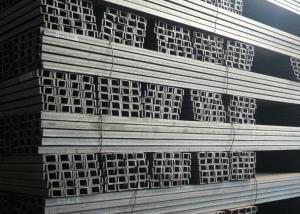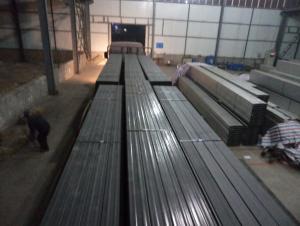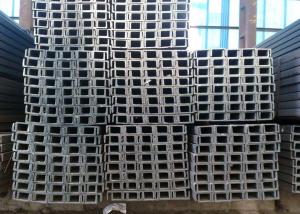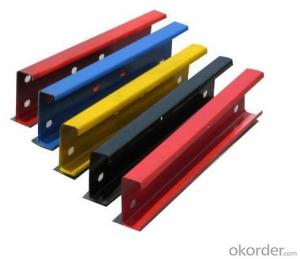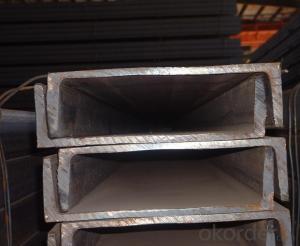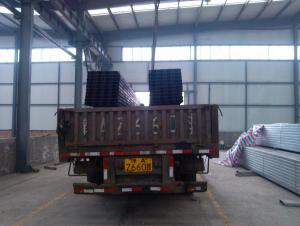Channel Bar Hot Rolled Mild U Channel Steel Bars
- Loading Port:
- Tianjin
- Payment Terms:
- TT or LC
- Min Order Qty:
- 100 m.t.
- Supply Capability:
- 35000 m.t./month
OKorder Service Pledge
OKorder Financial Service
You Might Also Like
OKorder is offering Channel Bar Hot Rolled Mild U Channel Steel Bars at great prices with worldwide shipping. Our supplier is a world-class manufacturer of steel, with our products utilized the world over. OKorder annually supplies products to African, South American and Asian markets. We provide quotations within 24 hours of receiving an inquiry and guarantee competitive prices.
Product Applications:
Channel Bar Hot Rolled Mild U Channel Steel Bars are ideal for structural applications and are widely used in the construction of buildings and bridges, and the manufacturing, petrochemical, and transportation industries.
Product Advantages:
OKorder's Channel Bar Hot Rolled Mild U Channel Steel Bars are durable, strong, and wide variety of sizes.
Main Product Features:
· Premium quality
· Prompt delivery & seaworthy packing (30 days after receiving deposit)
· Can be recycled and reused
· Mill test certification
· Professional Service
· Competitive pricing
Product Specifications:
Manufacture: Hot rolled
Grade: Q195 – 235
Certificates: ISO, SGS, BV, CIQ
Length: 6m – 12m, as per customer request
Packaging: Export packing, nude packing, bundled
Trademark | Rank | Chemical composition (quality score) % | |||||
C | Si | Mn | S | P | |||
≤ | ≤ | ≤ | |||||
Q235 | A | 0.14-0.22 | 0.30 | 0.30-0.65 | 0.050 | 0.045 | |
Q235 | B | 0.12-0.20 | 0.30 | 0.30-0.70 | 0.045 | 0.045 | |
Trademark | Rank | Pulling Test | |||||
Bend PointΔs/Mpa | Tensile Strength | Elongation Ratioδ5% | |||||
Thickness (Diameter) /MM | Thickness (Diameter) /MM | ||||||
≤16 | 16-40 | ≤16 | 16-40 | ||||
≥ | ≥ | ||||||
Q235 | A | 235 | 225 | 375-500 | 26 | 25 | |
Q235 | B | 235 | 225 | 375-500 | 26 | 25 | |
| JIS STANDARD CHANNEL | ||||||
| SIZE(MM) | h(mm) | b(mm) | s(mm) | t(mm) | kg/m | length |
| 50x25x3x6 | 50 | 25 | 3 | 6 | 2.37 | 6m,12m |
| 75X40x3.8x7 | 75 | 40 | 3.8 | 7 | 5.3 | 6m,12m |
| 75X40x4x7 | 75 | 40 | 4 | 7 | 5.6 | 6m,12m |
| 75X40x4.5x7 | 75 | 40 | 4.5 | 7 | 5.85 | 6m,12m |
| 75X40x5x7 | 75 | 40 | 5 | 7 | 6.92 | 6m,12m |
| 100X50x3.8x6 | 100 | 50 | 3.8 | 6 | 7.3 | 6m,12m |
| 100X50x4.2x6 | 100 | 50 | 4.2 | 6 | 8.03 | 6m,12m |
| 100X50x4.5x7.5 | 100 | 50 | 4.5 | 7.5 | 8.97 | 6m,12m |
| 100X50x5x7.5 | 100 | 50 | 5 | 7.5 | 9.36 | 6m,12m |
| 125X65x5.2x6.8 | 125 | 65 | 5.2 | 6.8 | 11.66 | 6m,12m |
| 125X65x5.3x6.8 | 125 | 65 | 5.3 | 6.8 | 12.17 | 6m,12m |
| 125X65x5.5x8 | 125 | 65 | 5.5 | 8 | 12.91 | 6m,12m |
| 125X65x6x8 | 125 | 65 | 6 | 8 | 13.4 | 6m,12m |
| 150x75x5.5x7.3 | 150 | 75 | 5.5 | 7.3 | 14.66 | 6m,12m |
| 150x75x5.7x10 | 150 | 75 | 5.7 | 10 | 16.71 | 6m,12m |
| 150x75x6x10 | 150 | 75 | 6 | 10 | 17.9 | 6m,12m |
| 150x75x6.5x10 | 150 | 75 | 6.5 | 10 | 18.6 | 6m,12m |
| 200X80x7.5x11 | 200 | 80 | 7.5 | 11 | 24.6 | 6m,12m |
FAQ:
Q1: Why buy Materials & Equipment from OKorder.com?
A1: All products offered byOKorder.com are carefully selected from China's most reliable manufacturing enterprises. Through its ISO certifications, OKorder.com adheres to the highest standards and a commitment to supply chain safety and customer satisfaction.
Q2: How do we guarantee the quality of our products?
A2: We have established an advanced quality management system which conducts strict quality tests at every step, from raw materials to the final product. At the same time, we provide extensive follow-up service assurances as required.
Q3: How soon can we receive the product after purchase?
A3: Within three days of placing an order, we will arrange production. The normal sizes with the normal grade can be produced within one month. The specific shipping date is dependent upon international and government factors, the delivery to international main port about 45-60days.
Images:
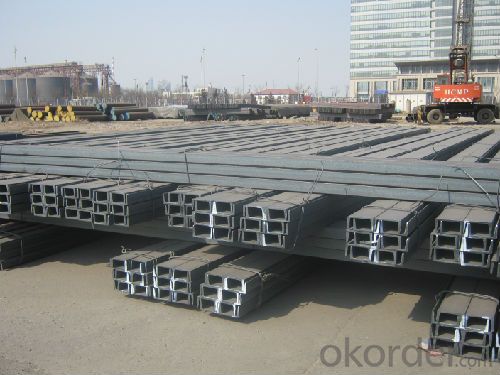
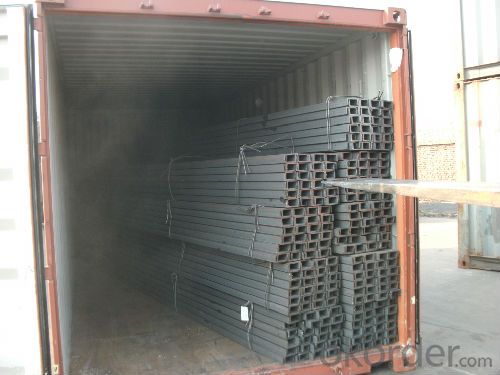
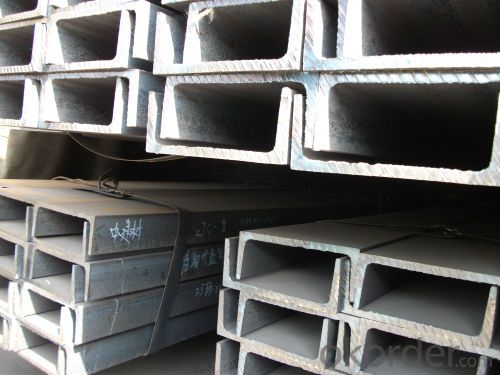
- Q: Which kind of wind resistance is better for square tube, square tube or channel steel?
- Square pipe and channel steel that load-bearing better 1, the same thickness and area, square superior to channel. 2, if the channel is closed to a rectangular tube, then the channel is better than the square tube.
- Q: Can steel channels be used for modular construction?
- Yes, steel channels can be used for modular construction. Steel channels are structural components made of steel that have a C-shaped cross-section. They are commonly used in construction for their strength and versatility. In modular construction, steel channels can be used to create the framework and support system for modular units. They can be easily fabricated and assembled to create a sturdy and durable structure. Steel channels are also lightweight, which makes them suitable for modular construction as they can be easily transported and assembled on-site. Additionally, steel channels have excellent load-bearing capabilities, which is essential for modular construction as it requires the ability to support and distribute the weight of the modules. Overall, steel channels are a popular choice for modular construction due to their strength, versatility, and ease of use.
- Q: Are steel channels suitable for solar panel installations?
- Solar panel installations can indeed make use of steel channels. These channels, also referred to as steel C-channels or U-channels, are widely utilized as mounting structures for solar panels. They provide a robust and long-lasting support system that guarantees the stability and durability of the panels. The reason why steel channels are preferred for solar panel installations lies in their high strength-to-weight ratio. This characteristic enables them to endure diverse environmental conditions. They also possess outstanding resistance to corrosion, a crucial factor for outdoor installations that are exposed to rain, snow, and humidity. Furthermore, steel channels can be customized and fabricated to fit specific solar panel dimensions, which allows for easy and secure attachment. Another advantage of steel channels is their cost-effectiveness compared to other mounting options, such as aluminum or stainless steel. They are readily available in the market and can be conveniently installed by professionals. Additionally, the versatility of steel channels makes them suitable for both ground-mounted and rooftop solar panel installations. To sum it up, steel channels are a trustworthy and appropriate choice for solar panel installations. Their strength, durability, resistance to corrosion, cost-effectiveness, and ease of installation make them an ideal option for providing support to solar panels and ensuring their optimal performance.
- Q: Can steel channels be used in load-bearing walls?
- Steel channels can indeed be utilized in load-bearing walls. Their high strength-to-weight ratio makes them a popular choice for providing structural support in construction projects. Load-bearing walls often benefit from the added stability and support that steel channels offer. These channels possess exceptional load-bearing capabilities, enabling them to withstand heavy vertical and horizontal loads. Moreover, integrating them into the wall structure is a straightforward process, making them a practical option for load-bearing applications. To guarantee compliance with building codes and regulations, it is crucial to seek input from a structural engineer or construction professional when selecting the appropriate steel channels for the desired load-bearing capacities.
- Q: Can steel channels be used for automotive applications?
- Yes, steel channels can be used for automotive applications. Steel channels are commonly used in the automotive industry for various purposes such as structural support, frame reinforcements, and chassis components. The high strength and durability of steel make it suitable for withstanding the rigorous demands of automotive applications, providing necessary stability and safety.
- Q: Can steel channels be used for mezzanine storage systems?
- Indeed, mezzanine storage systems can utilize steel channels. Owing to their robustness and longevity, steel channels are frequently employed in the construction of mezzanine floors. They offer a solid and secure foundation for bearing the load of storage items and seamlessly integrate into the overall design of the mezzanine structure. Steel channels can be tailored to meet specific needs and assembled through welding or bolting to establish a sturdy storage system. Moreover, steel channels boast corrosion resistance, rendering them suitable for enduring use in both indoor and outdoor storage settings.
- Q: Are steel channels suitable for mining and industrial applications?
- Steel channels are an excellent choice for mining and industrial applications. These structural elements are made of steel and possess exceptional strength and durability. This makes them perfect for heavy-duty tasks. In mining, steel channels are commonly used to construct support structures like roof supports, beams, and columns. They provide the necessary strength to withstand the extreme conditions, loads, and vibrations associated with mining operations. In industrial applications, steel channels are widely used for various purposes. They serve as support structures for heavy machinery and equipment, providing stability and rigidity. Steel channels also function as frames for conveyor systems, platforms, and walkways, ensuring safe and efficient movement within industrial facilities. Their versatility allows for customization and adaptation to specific requirements, making them an excellent choice for different industrial applications. Moreover, steel channels offer several advantages that make them suitable for mining and industrial applications. Firstly, steel is highly resistant to corrosion, which is crucial in environments where exposure to moisture, chemicals, and other harsh elements is common. This resistance ensures the longevity and reliability of the steel channels, reducing maintenance costs. Secondly, steel channels have excellent load-bearing capacity, allowing them to bear heavy loads and withstand significant forces. This is essential in mining and industrial settings, where heavy machinery, equipment, and materials are often involved. Lastly, steel channels are easy to fabricate and install, providing flexibility in design and construction. They come in various sizes, shapes, and lengths, allowing for customization to specific project requirements. Their easy installation also minimizes downtime during construction, ensuring efficient operations in mining and industrial applications. In conclusion, steel channels are highly suitable for mining and industrial applications due to their strength, durability, corrosion resistance, load-bearing capacity, and ease of fabrication and installation. They provide the necessary support and stability required in these demanding environments, making them a reliable choice for such applications.
- Q: Can steel channels be used for creating support structures for water treatment systems?
- Yes, steel channels can be used for creating support structures for water treatment systems. Steel channels are commonly used in construction and engineering projects due to their strength, durability, and ability to support heavy loads. When designing support structures for water treatment systems, it is important to consider the weight and size of the equipment and ensure that the support structure can withstand the load. Steel channels provide a robust and reliable option for creating support structures that can withstand the demands of water treatment systems. Additionally, steel channels can be easily fabricated and customized to fit specific project requirements, making them a versatile choice for creating support structures in water treatment systems.
- Q: What are the different methods of surface treatment for steel channels?
- There are several different methods of surface treatment for steel channels, each offering unique benefits and characteristics. Some of the commonly used methods are: 1. Hot-dip galvanizing: This method involves immersing the steel channels in a bath of molten zinc. The zinc coating provides excellent corrosion resistance and protects the steel from rust and other environmental factors. It is a popular choice for outdoor applications where long-term durability is required. 2. Powder coating: Powder coating is a dry finishing process in which a powdered polymer is electrostatically applied to the steel channels and then cured under heat. This method provides a durable and attractive finish, with a wide range of colors and textures available. Powder coating also offers excellent resistance to chipping, scratching, and fading. 3. Electroplating: Electroplating involves depositing a thin layer of metal, such as chromium or nickel, onto the surface of the steel channels through an electrochemical process. This method enhances the corrosion resistance and improves the appearance of the channels. Electroplating can also increase the hardness and wear resistance of the steel. 4. Paint coating: Paint coating is a common method where a layer of paint is applied to the surface of the steel channels. This method provides a decorative finish and also protects the steel from corrosion and weathering. Different types of paints, such as epoxy, acrylic, or polyurethane, can be used based on the specific requirements of the application. 5. Anodizing: Anodizing is primarily used for aluminum, but it can also be applied to steel channels. This process involves creating an oxide layer on the surface of the metal through an electrochemical reaction. Anodizing improves the corrosion resistance, provides a decorative finish, and can also enhance the wear resistance of the steel. 6. Phosphating: Phosphating is a chemical process that involves applying a phosphate coating to the surface of the steel channels. This method improves the adhesion of paint or other coatings, provides a protective layer against corrosion, and can also enhance the lubricity of the steel. Each method of surface treatment for steel channels has its own advantages and is suitable for different applications. The choice of the treatment method depends on factors such as the intended use of the channels, the environmental conditions, and the desired appearance and performance characteristics.
- Q: What kind of low carbon steel or medium carbon steel are they?
- Low carbon steelLow carbon steel (low carbon steel) as the carbon content of less than 0.25% of the carbon steel, because of its low strength, low hardness and soft, it is also called the mild steel. It includes most of the ordinary carbon structural steel and some high-quality carbon structural steel, most of which are not used for engineering structural parts without heat treatment. Some of them are used for wear-resistant mechanical parts after carburizing and other heat treatment.The annealed structure of low carbon steel is ferrite and a small amount of pearlite, its strength and hardness are lower, and its plasticity and toughness are better. Therefore, its cold forming property is good, and cold forming can be carried out by curling, bending and stamping. This kind of steel also has good weldability. Carbon content from 0.10% to 0.30% low carbon steel is easy to accept all kinds of processing, such as forging, welding and cutting. It is used to make chains, rivets, bolts, shafts and so on.Low carbon steel is generally rolled into angle steel, channel steel, I-beam, steel pipe, steel belt or steel plate. It is used to make all kinds of building components, containers, boxes, furnaces and agricultural machinery and so on. High quality low carbon steel is rolled into thin board, making deep drawing products such as automobile cab, engine cover, etc., also rolled into bars, used for making mechanical parts of low strength requirement. Low carbon steel is not treated by heat before use. The carbon content is above 0.15%. It is treated by carburizing or cyaniding. It is used for shaft, shaft sleeve, chain wheel and other parts which require high surface temperature and good wear resistance.
Send your message to us
Channel Bar Hot Rolled Mild U Channel Steel Bars
- Loading Port:
- Tianjin
- Payment Terms:
- TT or LC
- Min Order Qty:
- 100 m.t.
- Supply Capability:
- 35000 m.t./month
OKorder Service Pledge
OKorder Financial Service
Similar products
Hot products
Hot Searches
Related keywords
